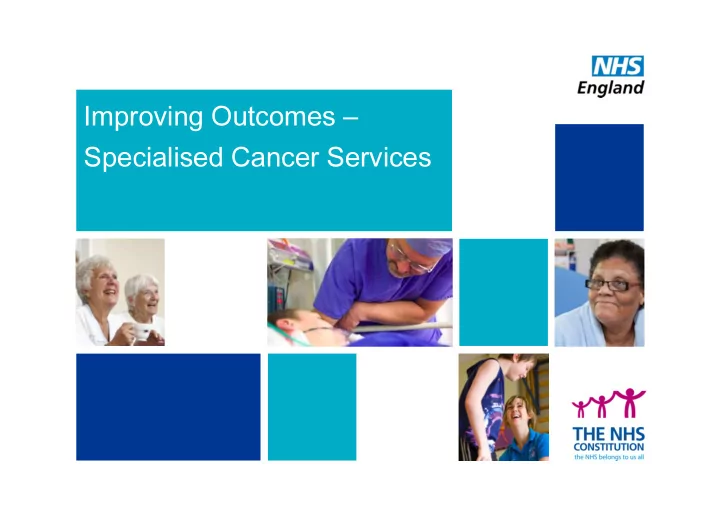

Improving Outcomes – Specialised Cancer Services
Purpose To engage with the Health Scrutiny Committee on the proposed redesign of some specialised cancer services. These plans have been developed to; • Improve outcomes of treatment • Ensure delivery of safe and sustainable services • Enhance patients’ experience • Ensure services meet standards set out in national guidance 2
What are Specialised Services? Highly specialised Specialised services (2) Specialised services (1) • ‘P athway’ • Rare conditions • Episodic specialised • Very low patient specialised numbers services services • Very few • Long term • Examples: hospitals conditions • Paediatric and • Examples: Neonatal • Examples: • Heart and lung Intensive care • Kidney care transplantation • S evere burn • Mental health • Treatment of care • Cardiac care rare eye • Specialised • Cancer conditions cancer surgery services 3
Why is change needed in specialised services? Too many Move providers towards 7 day working Some hospitals Some don't have Providers Too much enough are not variation in specialist seeing quality and staff enough outcomes patients Some providers are not meeting core quality 4 standards
Guiding principles The driver is improvement Plans must address in clinical outcomes and variations in access and outcomes patient experience Important to align the Open and transparent whole system of care approach to planning approach 5 5
INTEGRATION IS VITAL Clinical Commissioning Groups (CCGs) are critical to the ambition to achieve world-class patient outcomes and experience in specialised services. Strong working relationships and shared decision-making are important. NHS England CCGs Seamless patient pathway GP surgery Local hospital Specialist care Improved patient outcomes and experience
National Guidance for Specialised Cancer Services Improving clinical outcomes: • Specialised cancer teams managing minimum populations to maintain skills • Surgeons operating on minimum volumes • Need for a greater degree of specialisation • Larger centres of excellence 7
Commissioning Principles • NHS England will only commission specialised services from providers that meet national standards • Key drivers: • A clear focus on improved clinical outcomes • Patient experience and engagement • Specialist team working • Holistic care across pathway • Access to range of services - co-dependencies 8
Cancer Care across Greater Manchester • Some specialised cancer services do not currently meet national guidance (called Improving Outcomes Guidance) • Hepatobiliary and pancreas cancer • Gynaecology cancer • Urology cancer • Upper gastrointestinal cancer • This means these cancer services are not organised in the best possible way – there needs to be a single specialist team working together • This is known to affect the care patients receive. 9
� � � � � � � � � � � � � � � What this means for patients (1) • These changes relate specifically to specialist surgery • Most cancer treatment remains the same Cancer GP Referral & Complex Specialist surgery Chemotherapy Follow up and Service diagnosis in local diagnosis & radiotherapy supportive hospital care Hepatobiliary Some Fewer sites (1) and Pancreas change Gynaecology Fewer sites (2) Urology Fewer sites (2) Upper GI Fewer sites (2) 10 � = no change
What this means for patients (2) • Single service for Greater Manchester so that patients have access to same high quality care irrespective of where they live • Specialist surgery on two sites where required in line with population need • Close alignment with local cancer services – seamless care for patients from referral to follow up care 11
Specialised Cancer Surgery – Impact of Change Cancer Total number Rate per Estimate of Service of surgical 100,000 numbers of cases per (adult patients annum Population) affected by change Upper GI Total 150 6.3 50 Urology Total 546 21.6 330 Gynaecology Total 338 13.4 110 HPB Total 336 13.3 194 Grand Total 1370 684 12
Commissioning Approach Cancer Service Process Timeline Hepatobiliary and Implementation plan agreed October 2014 Pancreas Gynaecology Discussions progressing September 2014 Urology Procurement June 2014 Upper GI (OG) Procurement September 2014 13
Summary • Majority of cancer care will remain unchanged – diagnostic services, non specialist treatment, chemotherapy, radiotherapy and aftercare • Better outcomes will be achieved by concentrating complex diagnostic and surgical expertise and facilities for patients with rarer cancers • Safe and sustainable services will be provided by fewer specialist providers in centres of excellence • Scale of change will be minimal – a concentration of sites affects less than 700 patients undergoing surgical resections per annum • Governance arrangements between GPs, local hospitals and specialist centres will ensure consistent high quality care irrespective of where patients live. 14
Engagement and Consultation • There has been extensive engagement on the single service model through NHS Greater Manchester • Clinical teams and hospital managers support concentration of expertise on fewer sites • Our plans are closely aligned with CCGs – Healthier Together Programme • Close links with the Strategic Clinical Network to ensure engagement with patient groups, proposals have the support of local clinicians and are evidence based • National specifications have had public consultation • Clinical Reference Groups have patient representatives /national patient panel • OSCs will be provided with regular updates at each 15 milestone
Questions 16
Recommend
More recommend